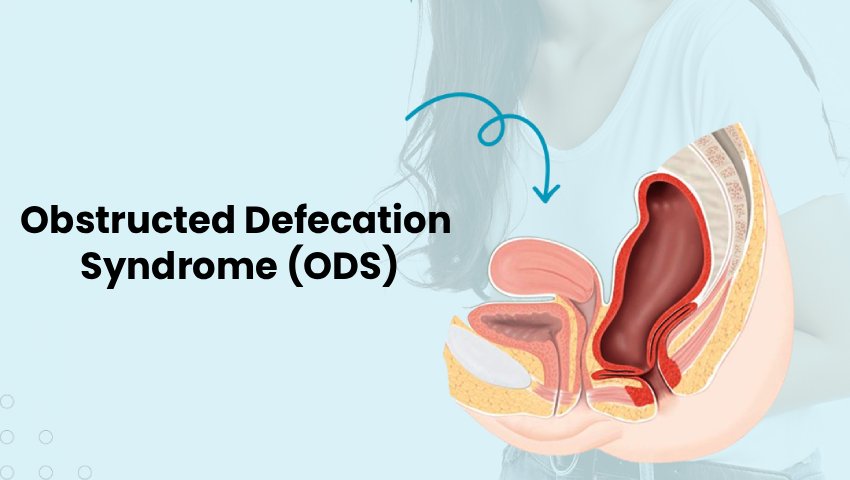
- 09/09/2025
- Kaizen Gastro Care
- 0 Comments
- Proctology
All You Need to Know About Obstructed Defecation Syndrome (ODS)
Constipation can be frustrating, especially when you experience difficulty passing stools despite feeling the urge. If you often strain during bowel movements without relief, it may be due to Obstructed Defecation Syndrome (ODS)—a common yet under-recognized condition that affects millions of people worldwide.
Understanding Obstructed Defecation Syndrome:
Obstructed Defecation Syndrome is a functional bowel disorder characterized by incomplete evacuation of the rectum despite repeated attempts. Unlike simple constipation, ODS involves mechanical or functional blockages that prevent normal bowel movements, leaving patients feeling frustrated and uncomfortable. This condition affects both men and women, though it’s more commonly seen in middle-aged and elderly individuals. The symptoms can significantly impact daily life, causing embarrassment and affecting one’s quality of life.
Common Symptoms of ODS:
Recognizing the signs of Obstructed Defecation Syndrome is crucial for early intervention. The most common symptoms include:
- Incomplete evacuation: Feeling like you haven’t completely emptied your bowels even after straining for extended periods.
- Excessive straining: Needing to apply significant pressure or strain for more than 25% of bowel movements.
- Hard, lumpy stools: Experiencing Bristol Stool Chart types 1-2 consistently.
- Prolonged toilet time: Spending unusually long periods in the bathroom without successful results.
- Digital assistance: Some patients find themselves needing manual assistance to complete bowel movements.
- Abdominal discomfort: Experiencing bloating, cramping, or general abdominal unease.
These symptoms typically occur at least three times per week and persist for several months, distinguishing ODS from temporary constipation.
What Causes Obstructed Defecation Syndrome?
Understanding the root causes helps in developing effective treatment strategies. ODS can result from various factors:
Structural Abnormalities:
- Rectocele (bulging of the rectal wall)
- Rectal prolapse or intussusception
- Enterocele (small bowel herniation)
- Pelvic floor dysfunction
Functional Disorders:
- Dyssynergic defecation (inability to coordinate pelvic floor muscles)
- Slow transit constipation
- Inadequate rectal sensation
Lifestyle Factors:
- Poor dietary habits with insufficient fiber intake
- Inadequate fluid consumption
- Sedentary lifestyle
- Ignoring the urge to defecate
Diagnosis - Getting to the Root of the Problem:
If you’re experiencing persistent symptoms, consulting a best gastroenterologist in Pune becomes essential for proper diagnosis. Dr. Samrat Jankar at Kaizen Gastro Care employs comprehensive diagnostic approaches to identify ODS accurately. The diagnostic process typically includes:
- Detailed Medical History: Understanding symptom patterns, duration, and associated factors.
- Physical Examination: Including digital rectal examination to assess anal sphincter function and detect structural abnormalities.
- Specialized Tests:
- Anorectal manometry to evaluate muscle function
- Defecography to visualize the defecation process
- Colonic transit studies to assess bowel movement patterns
- MRI or CT scans when structural abnormalities are suspected
At a top gastroenterology hospital in Pune like Kaizen Gastro Care, advanced diagnostic equipment ensures accurate identification of the underlying causes.
Treatment Options: From Conservative to Advanced:
Treatment for Obstructed Defecation Syndrome follows a step-wise approach, starting with conservative measures and progressing to more intensive interventions when necessary.
Conservative Management:
- Dietary Modifications: Increasing fiber intake through fruits, vegetables, and whole grains while ensuring adequate hydration can significantly improve symptoms.
- Lifestyle Changes: Regular exercise, establishing consistent toilet habits, and responding promptly to the urge to defecate help restore normal bowel patterns.
- Medications: Stool softeners, osmotic laxatives, or prescription medications may be recommended based on individual needs.
Advanced Therapies:
- Biofeedback Therapy: This specialized treatment helps retrain the pelvic floor muscles and coordination during defecation. Many leading gastroenterology specialists in Pune report excellent success rates with this approach.
- Pelvic Floor Physiotherapy: Targeted exercises and techniques to improve muscle coordination and strength.
- Surgical Interventions: In severe cases where conservative treatments fail, surgical options may include:
- Rectocele repair
- Rectal prolapse correction
- STARR procedure (Stapled Trans anal Rectal Resection)
Living with ODS: Practical Daily Management:
Managing Obstructed Defecation Syndrome requires patience and consistent lifestyle adjustments. Here are some practical tips:
- Establish a routine: Try to have bowel movements at the same time daily, preferably after meals when natural reflexes are strongest.
- Create a comfortable environment: Ensure privacy and comfort during toilet time without rushing.
- Stay hydrated: Drink plenty of water throughout the day to keep stools soft.
- Exercise regularly: Even simple walking can stimulate bowel movements and improve overall gut health.
- Manage stress: Stress can worsen digestive symptoms, so incorporate relaxation techniques into your daily routine.
When to Seek Professional Help:
While mild constipation is common, persistent symptoms warrant professional evaluation. Contact a renowned gastroenterologist in Pune if you experience:
- Symptoms persisting for more than three months
- Severe abdominal pain
- Blood in stools
- Unexpected weight loss
- Complete inability to pass stools
Dr. Samrat Jankar at Kaizen Gastro Care (Contact: 9763635252) specializes in comprehensive digestive health management, offering personalized treatment plans for complex conditions like ODS.
Conclusion:
Obstructed Defecation Syndrome doesn’t have to control your life. With proper diagnosis, appropriate treatment, and lifestyle modifications, most patients experience significant improvement in their symptoms and quality of life. The key lies in seeking timely professional help from experienced gastroenterology specialists who can provide evidence-based, holistic care tailored to your specific needs. Remember, digestive health issues are more common than you might think, and there’s no shame in seeking help. At Kaizen Gastro Care, patients receive compassionate, expert care in a comfortable environment designed to address all aspects of gastrointestinal health. If you’re struggling with persistent bowel movement difficulties, don’t suffer in silence. Reach out to qualified professionals who can guide you toward effective solutions and improved digestive wellness.
